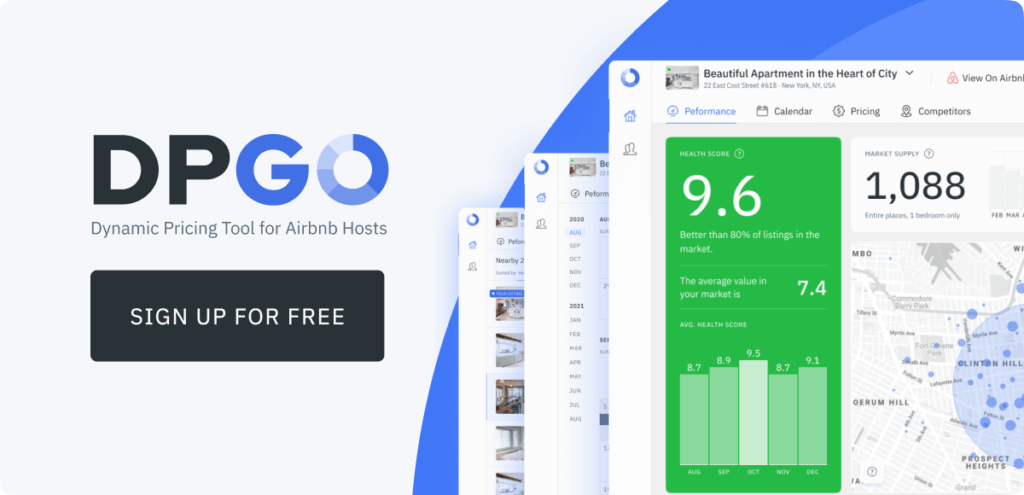We’ve become experts at boosting Airbnb income, thanks to heaps of data we’ve gathered. Our insights have already guided many to maximize their Airbnb income in peak season. But what about the quieter times? The off-peak season often gets overlooked, yet it holds untapped potential. This article shifts the focus to these less bustling periods. It’s time to explore how to significantly enhance your income when the usual tourist rush slows down. Let’s delve into strategies specifically tailored for these quieter months, transforming them into profitable opportunities.
Using this 7-step plan of attack, your Airbnb income will be higher than ever in the off-season!
Reduce Your Minimum Stay Requirement
In the vacation rental business, understanding seasonal trends is crucial. For Airbnb hosts, this means adapting your strategies throughout the year to optimize your Airbnb rental’s performance. In peak seasons, a longer minimum stay makes sense to maximize rental income. Yet, during off-peak times, such as the winter months, this approach needs a shift.
Typically, Airbnb guests’ stays are shorter in the winter compared to summer vacations. Recognizing this pattern can significantly boost your Airbnb property’s appeal. Therefore, if your Airbnb rental has a seven-day minimum stay in summer, reducing it to two days in winter can be a smart move. This change not only increases the likelihood of bookings but also enhances your potential for Airbnb revenue.
Shorter minimum stays cater to a wider range of Airbnb guests, especially those seeking brief escapes. By accommodating these needs, your Airbnb earnings can remain stable, even when the traditional vacation rush wanes. Remember, every booking, no matter how short, contributes to your overall rental income.
Being flexible with stay requirements is a strategic way Airbnb hosts earn extra income during slower periods. It’s about adapting to the market and meeting Airbnb guests where their needs are. This approach fills up your calendar and keeps your Airbnb property competitive and profitable year-round.

Offer Discounts to Encourage Longer Stays
In the vacation rental industry, the off-season presents unique opportunities for Airbnb hosts. While offering discounts during peak seasons might not be necessary, the off-season is an ideal time to implement this strategy. By providing discounts, Airbnb hosts can encourage guests to extend their stays, thereby increasing the rental income potential of each booking. By offering your guests a financial incentive to extend their stay, you’re putting yourself in the best position.
For users of DPGO, a popular tool among Airbnb hosts, adding discounts to your Airbnb rental is straightforward and effective. This feature allows you to easily incentivize longer stays, a key strategy in enhancing your Airbnb property’s appeal during slower periods. By logging into your DPGO account and navigating to ‘Settings’ and then ‘Discounts,’ you can set specific discounts for week-long or month-long stays. Such discounts not only make your property more attractive but also help in sustaining a steady flow of Airbnb revenue.
Implementing these discounts is a proactive way to ensure your Airbnb property remains competitive. It’s a strategic move that seasoned hosts use to earn more during times when bookings are naturally fewer. Discounts can transform a typically slow season into a period of unexpected profitability. You can read more about why discounts are important here.
By adopting such strategies, Airbnb hosts can optimize their rental income throughout the year, and it’s always wise to consult a tax professional in this regard. Understanding the dynamics of the vacation rental market and adapting your approach is key. Discounts, for instance, are a powerful tool that can help maintain steady Airbnb revenue, even when demand is lower than usual. A tax professional can offer valuable insights into how these strategies impact your financial responsibilities and benefits.

Optimize Rates with Dynamic Pricing
Utilizing a dynamic pricing engine is a game-changer in the vacation rental sector, especially for Airbnb hosts. It’s not just about setting a price; it’s about optimizing your income taxes through smart business decisions. Tax deductions can be significantly influenced by how you manage your Airbnb host business expenses, including the tools you use for pricing your rental properties.
A dynamic pricing engine like DPGO isn’t just about increasing revenue; it’s an investment in the financial health of your short-term rental business. With such tools, Airbnb hosts can ensure they are not leaving all the money on the table. For those managing an entire house as a vacation home or several rental properties, the stakes are even higher. A reliable Airbnb estimator is essential for making informed decisions.
DPGO stands out in this regard. Its advanced pricing algorithm is tailored for vacation rental properties, including single rooms and entire houses. The tool considers a wide range of factors, from local demand to broader market trends. This comprehensive approach helps ensure your rental property is priced optimally for every scenario.
Moreover, DPGO’s affordability makes it accessible for property managers and independent hosts alike. By continuously collecting and analyzing data, DPGO helps in setting the most advantageous prices. This ability to dynamically adjust rates based on real-time market data can significantly impact your overall rental income.
For anyone in the vacation rental business, whether you’re an individual Airbnb host or managing multiple properties, integrating a tool like DPGO can be pivotal. It’s not just about setting the right security deposit or handling operational aspects; it’s about strategically positioning your rental property in the market to maximize returns and make the most of your investment.

Update Listing to Increase Seasonal Appeal
As a host, you need to be aware of your property’s strengths and weaknesses to effectively boost your Airbnb income in the off-season. In slower periods like winter, it’s a great idea to refresh your online listing and highlight the aspects of your property that make it perfect for a winter getaway.
Most hosts realize the importance of an appealing Airbnb listing, but many may not fully utilize the potential of their property in different seasons. An Airbnb calculator can be an invaluable tool in this process, helping to gauge the financial impact of various features and services you offer.
During off-peak seasons like winter, it’s crucial for hosts to reassess and refresh their listings. If your entire home boasts amenities like a cozy fireplace or a relaxing Jacuzzi, these should be front and center in your listing. Such features not only attract guests looking for a winter escape but can also significantly boost your passive income during slower months. Proximity to winter attractions, like ski resorts, is a huge plus and should be highlighted.

Add Capacity to Your Listing
Adding capacity isn’t just a good idea in off-peak seasons. Adding capacity just means you can charge more. Yes, listings with three beds in one room are going to attract family bookings. By increasing the number of guests you can host, you spread your appeal to bigger groups, families, and even corporate retreats if you can house enough people. This is particularly relevant for short-term rentals, where flexibility in hosting different guest types can lead to more money.
However, with increased capacity comes the need for more thorough cleaning services. A reasonable cleaning fee is essential to maintain the quality of your property. Professional cleaners can ensure that your vacation rental, whether it’s your own home or a dedicated rental space, remains in top condition. This not only improves guest satisfaction but also helps maintain the value of your property.
Cleaning fees are a standard part of short-term rentals and should be communicated clearly in your listing. Many hosts find that guests are willing to pay these fees for the convenience and assurance of a clean, well-maintained space. By balancing the added capacity with professional cleaning services and appropriate fees, you can maximize the earning potential of your vacation rental property.

Cater to Business Travellers
One thing that does not stop in the winter months is business. Business travelers still need catering for during the off-season and by optimizing your listing to attract them, you give yourself the best shot at appealing to the few bookings that come around in quieter times. The ‘digital nomad’ is a relatively new tourist group but remote.
Add faster internet, a desk, and even some printing facilities to appeal to business travelers. It would also be a great idea to create a detailed guest guide, with taxi services and the details of nearby conference facilities. Also, it couldn’t hurt to invest in a fancy coffee machine!

Make Your Listing Pet & Child Friendly
Like optimizing your property for business travelers and digital nomads, updating your short term rental listing to appeal to families and pet owners is another way to boost your Airbnb income in the off-season.
For Families:
- Provide amenities such as cribs, high chairs, and baby gates to make your property more appealing to families with young children
- Include a detailed description of nearby family-friendly attractions, parks, and restaurants in your listing
- Consider offering a discount for longer stays, as families often prefer to book accommodations for extended periods

For Pet-Owners:
- Update your insurance policy to cover any potential damages caused by pets
- Update your lease addendum to include specific rules and regulations for pet owners, such as cleaning up after their pets and keeping them on a leash
- Consider charging an additional rental fee for pet ownership
- Provide information about nearby pet-friendly parks, walking trails, and pet stores in your listing
Allowing pets in your rental property can help you fill vacant units faster, as it widens the pool of potential tenants. However, there are some disadvantages to consider, such as the potential for noise pollution and damage to your property. To minimize these risks, you can:
- Require additional rent and pet deposits for tenants with pets
- Write terms in the lease that mandate frequent inspections and a professional cleaning upon the tenant’s move-out
- Establish pet waste elimination zones on your property and require tenants to clean up after their pets
It’s not a season-specific thing but permitting both children and pets in your listing is a good way to increase the likelihood of securing a booking in any season!

Boosting your Airbnb income in the off-season is not a simple, one-step process. Instead, you’ll have to optimize every aspect of your listing, business approach, and pricing to increase our revenue in the quieter months.




Comments are closed.